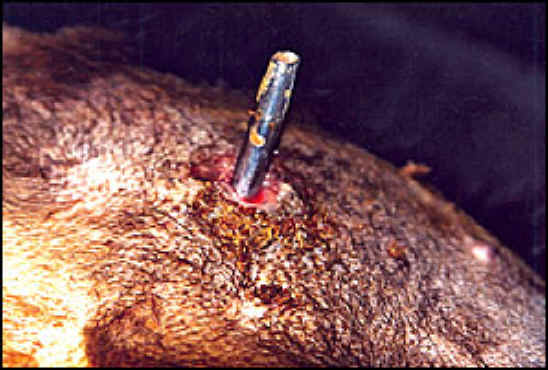The South Korean government should be applauded for taking this huge step forward, as South Korea is one of a handful of countries that still farm bears for bile, using horrific and gruesome methods to house the bears before they are slaughtered to extract the bile. This age old method is still in place despite many other herbal alternatives.
Throughout Asia, around 12,000 bears are housed in tiny cages, resting on bars for their entire life. Naturally, the bears are showing signs of psychological distress; bar biting, rocking and head banging. To extract the bile, which is thought to cure a range of diseases, the bears, depending on the country are either:
1. Raised in a cage until a certain age, and then killed and the gall bladder removed.

An Entire Bear Gall Bladder. Source: www.acres.org.sg
2. An ultrasound machine is used to locate the gall bladder and a syringe is inserted in the area, and the bile removed.

Bear with 'Modern' method of extracting bile. Source: Animals Asia
3. An open wound leading to the gall bladder is created and a catheter is inserted to let the bile drip out. In order to maintain this method, the wound needs to be reopened several times a day.

Catheter Used to Extract Bile. Source: www.all-creature.org
The conditions of the bear farms actually means that instead of working as a medicine, bear bile can actually cause harm to those who take it, due to the unhygienic conditions the bears are kept in, and the methods used to extract it.
WSPA reports that there are 1,400 bears currently being farmed in South Korean bear farms, where, unlike most other bear bile farming countries, in South Korea it is illegal to extract the bile while the bears are alive, instead the bears are kept in cramped cages until they reach ten years and are then slaughtered and the bile extracted.
If the South Korean government does push ahead for a ban, then it will provide hope, not only for the bears housed in the farms, but for all those who are working in the exhausting field of ending bear bile farming. The government actually informally asked WSPA and GKU to investigate feasible methods to phase out farming in the country, a positive and progressive sign.
Not only is bear bile consumed in the countries with farms, but the bile and the gall bladders are illegally imported to countries all over the world, including Singapore.
If you use traditional medicines, please ensure that your practitioner does not use any endangered animals in their products, including tiger parts or bear bile. If you live in a country that does not farm the animals, then they would have been imported, which is illegal and against CITES. If you do live in a country that farms, ask for herbal alternatives. Once the buying stops, the killing stops.
No comments:
Post a Comment